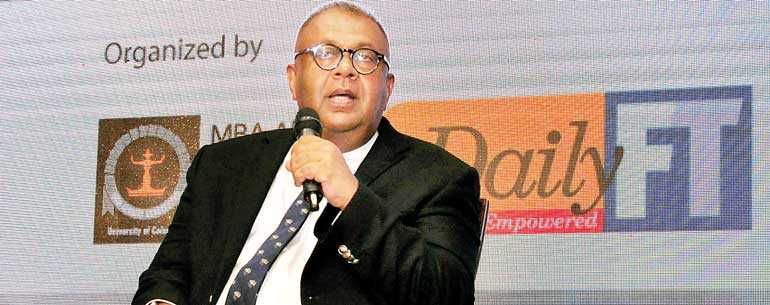Sunday Feb 22, 2026
Sunday Feb 22, 2026
Thursday, 7 March 2019 01:17 - - {{hitsCtrl.values.hits}}

Says execution will be better as policy direction by one party
Older proposals such as shipping liberalisation to get dusted off
Insists Budget not election-targetted but “caring and values-driven” and champions free markets and enterprise
But quips Budget 2019 will assist polls win
Estimates Rs.270 b liquidity injected into market to foster growth
Raising public revenues, fiscal consolidation remains focus
By Uditha Jayasinghe and Charumini de Silva
As the Cabinet is made up of one party, Finance Minister Mangala Samaraweera was yesterday optimistic of stronger implementation, and credited Budget 2019 with possessing policy consistency that would assist the Government to foster growth, focus on reforms, and possibly dust off older proposals such as shipping liberalisation.
Speaking at the post-Budget forum titled “Dissecting Budget 2019” jointly organised by the Daily FT and the University of Colombo MBA Alumni Association with strategic partnership of the Standard Chartered Banka, Minister Samaraweera acknowledged that execution has been a long running issue. However, he pointed out that after the constitutional crisis the United National Party (UNP) together with their coalition partners had formed a Government, which eased the challenge of having to deal with contradictory policies.
“The implementation of many of our Budget proposals had been a perennial problem. When I took over as the Finance Minister, I did a little survey on what percentage of Budget proposals have been implemented in each year, and I must say that the percentage was very low. As a result, we decided to set up several Committees last year to oversee and monitor the implementation carefully. But it has resulted in some improvements, but not a satisfactory improvement. That is the challenge we have continued facing,” he said, responding to questions from the packed audience.
“Because it is an election year, I am determined from tomorrow itself to start driving these proposals, and see how we can implement it in the shortest time possible. Despite being an election year, we are quite confident that we will be back again to continue with the work,” he added. Minister Samaraweera quipped that even though a “Unity Government” was formed in 2015, its “unity was doubtful” and conceded that different polices had to be accounted for. But this constraint had now lifted and the Government had the opportunity to push ahead with its tasks.
“In my last year’s Budget, I promised to liberalise the shipping sector, and I think it is a must if we are moving beyond being a mere transshipment port for India. Because of these policy differences we had, we were unable to do the reforms, although it actually involves a little change in the regulations. I hope now that the UNP or UNF is in office, we hope to initiate these major reforms in the next two months.”
Budget 2019 was balanced, because it contains both fiscal consolidation and reform proposals, as well as measures targeted at elections, the Minister stated. He described it as a Budget that champions free trade, free enterprise and global markets. He pointed out that the Budget, Gamperaliya, and Enterprise Sri Lanka, as well as recent Central Bank policy decisions, were concentrated on funnelling more liquidity into markets to address slow growth.
“The Government has already taken action to address cash flow in the economy, as the Treasury has released Rs. 60 billion to settle outstanding payments to contractors, while the Central Bank has relaxed the Statutory Reserve Requirements (SRR) on two occasions, releasing a further Rs. 150 billion. Therefore, a total of over Rs. 270 billion has recently been injected into the system.”
Public revenue targets would also be spruced up and pursued, Samaraweera said, with a new Commissioner General for the Inland Revenue Department to be appointed after the next six months, while a new Commissioner General will be appointed by April for the Excise Department. Efforts would also focus on passing a new Customs Act.
“We have also identified a number of structural constraints, which the Budget addresses upfront, that include significant investments to upgrade skills to align human resource capabilities to match workforce demands. In this context, the Government is supporting approaches such as apprenticeship and internship programs managed by the private sector. Particularly in sectors such as health and IT, private sector-driven skills development programs will be supported in the form of stipends.”
“The Budget is about transforming our nation from a feudal myopic mindset, to a modern, dynamic and prosperous society, based on the universal values of democracy, inclusivity and reconciliation,” he added.
The Forum featured an eminent panel of private sector leaders and professionals. They were John Keells Holdings Chairman Krishan Balendra, former Central Bank Deputy Governor W.A. Wijewardena, Chevron Lubricants Lanka PLC Managing Director and CEO Patrick McCloud, National Chamber of Exporters’ first woman President Ramya Weerakoon, Standard Chartered Bank CEO BingumalThewarathanthri and Technical partner PwC’sTax Advisory Director Charmaine Tillekeratne. Finance Ministry Senior Advisor Mano Tittawela and Economic Advisor Deshal de Mel also figured in the panel.
Market research partner is PepperCube Consultants Ltd., Creative partner of the post-Budget forum is Triad, print partner is Print Point, electronic media partner is Derana, and hospitality partner is Cinnamon Lakeside.
Full report on the post Budget forum will be published in FT shortly.
